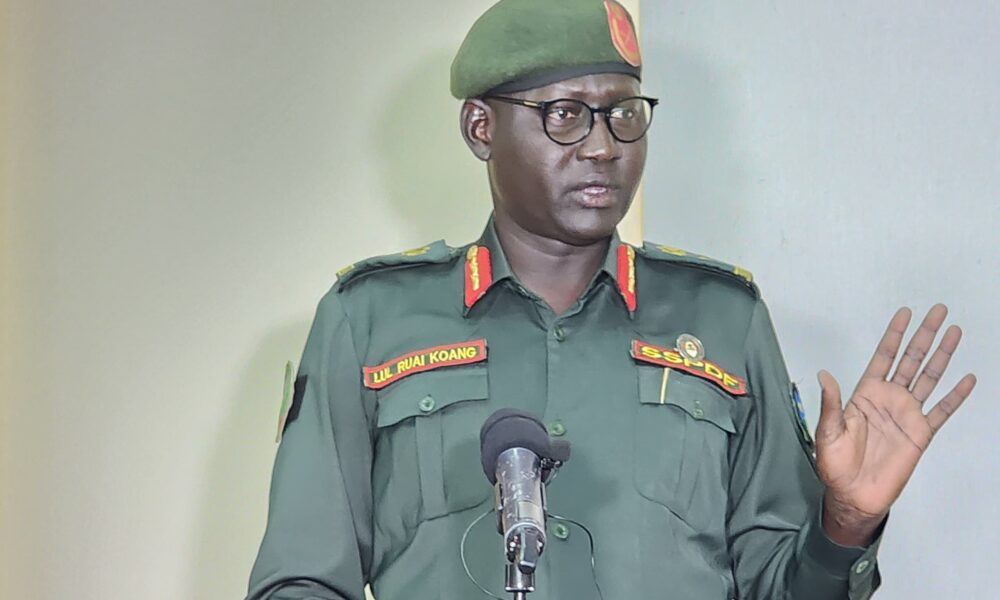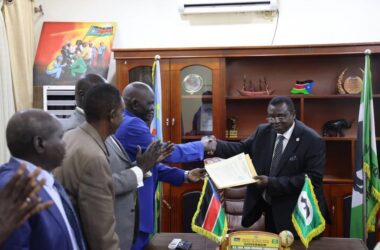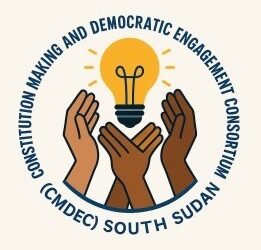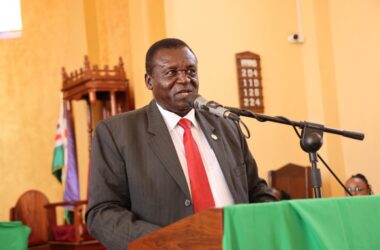By Philip Buda Ladu
On going recruitment drive in the country does not jeopardize the implementation of Chapter Two of the 2018 Revitalized Agreement on Resolution of Conflict in South Sudan (R-ARCSS), the army has said.
South Sudan People’s Defense Forces (SSPDF), Spokesperson, Major General Lul Ruai Koang clarified following media queries on the recent announcement of recruitment drive for a riverine force and a peacekeeping contingent, whether it doesn’t jeopardize the security agreements.
Speaking at a press conference at the Army General Headquarters in Bilpam, Maj. Gen. Ruai acknowledged ongoing challenges in the peace agreement’s implementation, particularly concerning the unification of second level of command of the unified forces.
“We have not yet made major changes [in unifying the second level of command]. We are still working very hard,” stated Maj. Gen. Koang, attributing some delays to frequent leadership changes within relevant dockets.
He further emphasized the critical role of financial resources, noting, “The biggest problem is that where there is no money, there is nothing one can do. So the government is still mobilizing for money.”
The SSPDF spokesperson also highlighted the “state of affairs within SPLM/A-IO,” referring to recent briefings by Information Minister, Hon. Michael Makuei and Cabinet Minister Hon. Dr. Elia Lomuro on the splintering of the SPLM/A-IO into four factions, a matter he stated was beyond his jurisdictions.
Addressing questions about the recruitment announcements, specifically for a 3,000-strong riverine force and a 1,000-member SSPDF peacekeeping force, Maj. Gen. Ruai firmly asserted that these initiatives are not in conflict with Chapter Two security arrangements of the R-ARCSS.
Regarding the peacekeeping recruitment, he explained, “recruitment for peacekeeping purposes, I think it is within the confines of law and that is why we have UN here on the ground and our force was mandated by the East African community to go to Congo and keep peace.”
He clarified that the recently returned SSPDF contingent of the regional forces from the DRC have not been committed to any operations within South Sudan, with internal security issues being handled by the SSPDF.
Maj. Gen. Ruai’s core explanation centered on the necessity of the riverine force. He revealed a critical problem of illegal checkpoints along the River Nile, citing reports of 63 to 86 such checkpoints between Juba and Renk, manned by various actors including SPLA-IO, SSPDF elements, and armed communities.
“The UN has been urging us to dismantle these checkpoints along River Nile. Civilians have been doing the same. Traders have been complaining that all these checkpoints cause unnecessary delays in terms of movement,” the army spokesperson stressed.
He added that these illicit charges are ultimately passed on to consumers, hindering economic activity and humanitarian aid delivery.
Gen. Ruai emphasized the strategic importance of a secure River Nile, which passes through Central Equatoria, Jonglei, Lakes, Unity, Upper Nile, and parts of the Ruweng administrative area. “More than 70% of the River Nile passes through,” he noted, highlighting the benefits of a “river Nile that is free of illegal checkpoints” for both citizens and the humanitarian community.
“The recruitment [for the riverine force] we are doing it. We are not doing it for another purpose. We are doing it to clear the River Nile of illegal checkpoints,” he reiterated
He stressed the need for a strong riverine force to patrol the main river and its tributaries, combatting piracy and other criminal activities that have plagued the waterways.
Gen. Ruai reiterated his belief that both recruitment announcements are “not in conflict with the Chapter Two security arrangements of the revitalized peace agreement,” but rather crucial steps towards enhancing national security and facilitating humanitarian and economic activities.




